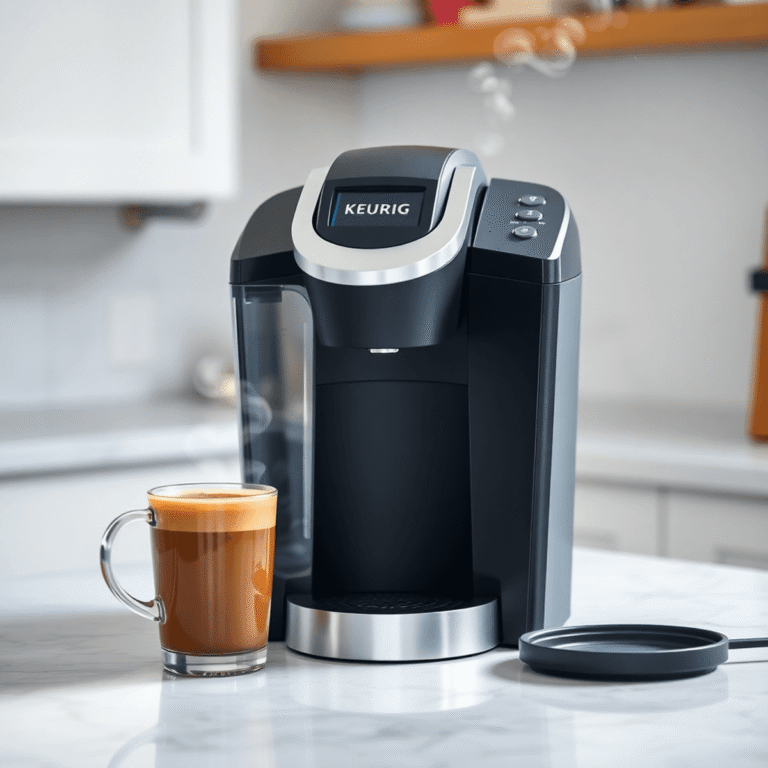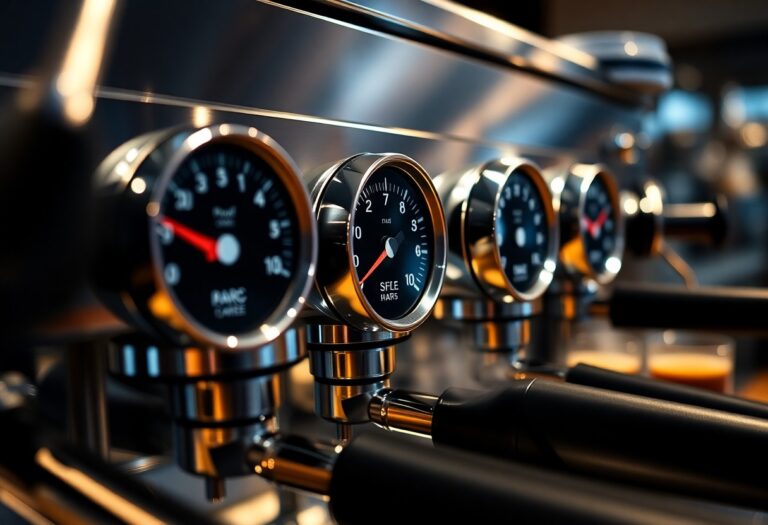What Happens if You Don’t Descale Your Coffee Machine – Consequences
There’s a significant risk to your coffee experience if you neglect to descale your coffee machine. Without regular descaling, mineral buildup can affect the taste of your brew, leading to bitter, unappealing flavors that overshadow your morning routine. Furthermore, neglecting this maintenance can cause your machine to operate inefficiently, resulting in potential damage that may require costly repairs or replacements. By prioritizing descaling, you protect the quality of your coffee and the longevity of your machine.

Key Takeaways:
- Neglecting to descale your coffee machine can lead to mineral buildup, affecting the taste and quality of your brewed coffee.
- Without regular descaling, the machine may experience decreased efficiency, resulting in longer brewing times and weaker coffee.
- Scale accumulation can cause internal components to overheat and malfunction, potentially leading to costly repairs or replacement.
- A lack of maintenance increases the risk of bacterial growth inside the machine, compromising hygiene and safety with every cup brewed.
- Over time, failure to descale can void warranties, as many manufacturers require regular maintenance to honor coverage.
The Silent Build-Up: How Scale Affects Performance
Ignoring regular descaling leads to a silent build-up of limescale, which can significantly impair your coffee machine’s performance. Over time, this accumulation restricts flow paths and weakens the heating element, resulting in longer brew cycles. You’ll notice inconsistent water temperatures, often leading to coffee that tastes flat and lacks depth. Ultimately, neglecting this maintenance can shorten your machine’s lifespan, costing you more in repairs or replacements.
Identifying Scale Buildup: Signs and Symptoms
Recognizing the early signs of scale buildup is vital to preserving your equipment’s functionality. Look for symptoms such as slower brewing times, irregular water flow, or an unusual white residue around the water reservoir. If your coffee has started tasting bitter or weak, it may indicate that mineral deposits are affecting the extraction process. Pay attention to any strange noises during operation; these may be signs of an overworked machine struggling against the scale.
The Chemistry of Scale: Mineral Deposits Explained
Scale primarily consists of calcium and magnesium carbonate, minerals common in hard water. When water is heated in your coffee machine, these minerals precipitate out, forming solid deposits that cling to internal components. Over time, these deposits can harden and create significant blockages, disrupting normal flow and heat transfer. High levels of scale not only damage your machine but also hinder the extraction of coffee flavors, leading to a subpar brew experience.
This process occurs due to the reactions between the dissolved minerals in your water and the temperature changes within the machine. As water heats up during brewing, its capacity to hold these minerals decreases, causing them to crystallize and adhere to surfaces. Consequently, areas like the heat exchanger and water lines become coated with scale, which can quickly escalate from minor inconvenience to major operational issues. Continuous exposure to these deposits can even lead to overheating and burnout of the machine’s heating element, resulting in costly repairs or replacements. Regular descaling mitigates these risks, ensuring that your coffee brewing remains both efficient and delicious.

A Bitter Brew: Impact on Coffee Quality
Neglecting the descaling of your coffee machine dramatically affects the quality of your brew. The accumulation of mineral deposits leads to off-flavors, poor extraction, and ultimately a less satisfying cup of coffee. Your once vibrant and aromatic brew can transform into a dull, bitter liquid that hardly resembles the delightful beverage you expect.
Flavor Alterations: The Taste Test
As minerals build up over time, they affect the overall flavor profile of your coffee. You might notice an unpleasant bitterness that overshadows the natural notes of your beans, leading to an unsatisfactory tasting experience that can drive even the most loyal coffee lovers to seek alternatives.
Brew Temperature Disruption: Consequences for Extraction
The accumulation of scale in your machine can cause a disruption in optimal brew temperatures. When your coffee machine struggles to reach the ideal temperature, it leads to uneven extraction. This means that the imperative flavors and oils that contribute to your coffee’s richness might not be fully released, resulting in a lackluster cup.
| Optimal Brewing Temperature | 195°F – 205°F (90°C – 96°C) |
| Too Low Temperature | Below 195°F (90°C) |
| High Temperature Impact | Over 205°F (96°C) leads to bitter taste |
When brew temperatures fall below 195°F, you can expect an under-extracted coffee, resulting in a flat taste lacking the vibrant notes you desire. At the same time, brewing above 205°F could extract undesirable bitter compounds, ruining your morning ritual. Keeping your coffee machine clean and regularly descaling it can help maintain optimal temperatures and ensure the extraction process highlights the best qualities of your beans.
| Scale Accumulation Level | Resulting Brew Temperature |
| Low | Close to optimal |
| Moderate | Lower than optimal |
| Heavy | Significantly lower or inconsistently high |
The Economic Factor: Cost of Neglect
Neglecting to maintain your coffee machine through regular descaling significantly affects your wallet, leading to higher operational costs over time. Ignoring this important maintenance task can result in decreased efficiency, leading to more frequent replacement of coffee machines and associated components. Ultimately, the cost of neglect can far outweigh the minimal investment in routine descaling.
Increased Energy Consumption: A Hidden Drain
A coffee machine that hasn’t been descaled operates less efficiently, leading to an increase in energy consumption. As mineral deposits build up, your machine has to work harder and longer to heat water, which translates into higher electricity bills. Over time, these extra costs can add up, making neglecting descaling an expensive gamble.
The Risk of Expensive Repairs: When Machines Fail
Failing to descale your coffee machine exposes it to the risk of severe damage. The mineral buildup can clog vital components, leading to malfunction and potential breakdown. This kind of neglect often results in repair costs that can reach hundreds of dollars, depending on the extent of the damage. Regular descaling, on the other hand, helps avoid these costly incidents by keeping your machine in peak operating condition.
The risks associated with expensive repairs are not merely hypothetical; they are grounded in reality faced by many coffee enthusiasts. For instance, if mineral buildup causes a heater element to fail, replacing it could cost you around $150 to $200. Additionally, if the scale damages the pump, you might face the prospect of spending even more. By prioritizing descaling, you not only preserve the quality of your coffee but also safeguard your finances from unexpected repair bills, ensuring a fully functional machine for a longer period.
The Lifespan Dilemma: How Maintenance Practices Affect Durability
Your coffee machine’s lifespan directly correlates with the maintenance you provide, particularly through descaling. A well-cared-for machine can last for years, while neglect can significantly shorten its operational life. Regular descaling removes mineral buildup, which can lead to overheating and mechanical failures. By managing your machine’s upkeep, you ensure it continues brewing delicious coffee for an extended period.
Relation Between Descaling and Longevity
Descaling your coffee machine is important for its longevity. Calcium and other mineral deposits, if left untreated, cause wear on components like heating elements and pumps. This buildup strains your machine, often resulting in breakdowns. When you prioritize yearly or biannual descaling, you’re actively prolonging your coffee machine’s lifespan, saving yourself from premature replacements.
The Replacement Cycle: Understanding the Financial Impact
The financial implications of neglecting to descale your coffee machine can be substantial. Routine maintenance, including descaling, may seem like an added expense, but the cost of replacing a machine early due to poor upkeep far outweighs this. A typical quality coffee machine can range from $100 to $500, and needing to replace it every few years versus extending its life for a decade genuinely impacts your budget.
For example, let’s say you invest in a high-quality coffee machine for $300. If neglecting maintenance leads to a breakdown within three years, you’re facing a potential replacement cost of $300 or more, making your daily brew significantly more expensive. In contrast, with proper descaling, you might extend its operational life to ten years, bringing your annual cost down to only $30. Thus, regular maintenance represents not just care for your coffee machine, but a substantial saving for your wallet over time.
Practical Solutions: How to Maintain a Clean Coffee Machine
Regular maintenance ensures your coffee machine brews consistently great-tasting coffee while prolonging its lifespan. A simple routine can keep your machine in optimal shape. Begin by wiping the exterior and removing any coffee grounds after each use. Additionally, you should run a cleaning cycle monthly using a gentle cleaning solution designed for coffee machines. This proactive approach significantly reduces the accumulation of oils, stains, and mineral buildup that can affect your coffee’s flavor.
Best Descaling Practices: Frequency and Methods
Descaling should be performed every 1-3 months, depending on your water hardness and usage frequency. If you use hard water or brew coffee daily, opt for the more frequent schedule. To descale, mix a commercial descaler or use a vinegar-water solution, running it through your machine as if you were brewing coffee. Rinse thoroughly with clean water afterward to eliminate any lingering taste from the descaling agent.
Recommended Products: What Works Best
A variety of descaling solutions are available, and choosing the right one is crucial for effective maintenance. Many coffee enthusiasts trust brands like Urnex and Durgol, which are specifically designed for coffee machines and provide reliable results. Natural alternatives, such as white vinegar, also work effectively, but they may leave a residual taste if not rinsed properly. Ensure that any solution you choose is compatible with your machine, as certain materials and components may be sensitive to stronger chemicals.
For the best results, opt for the Urnex Coffee Machine Descaler, popular among coffee lovers for its balanced formula that won’t harm machine parts. Durgol Express is another excellent option, featuring a fast-acting solution that quickly dissolves scale while being safe for various types of coffee makers. Both products are easy to use and highly effective, providing peace of mind that your machine remains in top condition without any adverse effects on your coffee. Keeping these products on hand will make regular maintenance a breeze.
To wrap up
On the whole, neglecting to descale your coffee machine can lead to a myriad of issues, including reduced efficiency and compromised taste in your brews. Mineral buildup affects the heating elements and internal components, ultimately shortening your machine’s lifespan. Additionally, you may find yourself faced with longer brewing times and poor water flow, which detracts from your coffee-making experience. By prioritizing descaling, you ensure optimal performance and the delicious flavor you expect from every cup.
Q: What does descaling a coffee machine involve?
A: Descaling a coffee machine typically involves removing mineral buildup, especially calcium and lime deposits, that accumulate from hard water. This process usually requires a descaling solution, which can be a commercial product or a mixture of vinegar and water. The solution is run through the coffee machine following the manufacturer’s instructions, ensuring that the internal components remain clean and functional.
Q: What are the signs that my coffee machine needs descaling?
A: Indications that your coffee machine may need descaling include slower brewing times, an unusual taste in the coffee, a reduction in the machine’s overall performance, or visible mineral buildup within the water reservoir or on water lines. If you notice any of these symptoms, it’s advisable to descale the machine promptly to improve its efficiency and the quality of your coffee.
Q: What potential damage can occur if I don’t descale my coffee machine?
A: Neglecting to descale your coffee machine can lead to several issues, such as blocked water flow, which may cause overheating and damage internal components. Additionally, mineral deposits can corrode imperative parts, leading to more extensive repairs or the need for a complete replacement. Over time, this lack of maintenance can lead to a machine that no longer brews coffee properly.
Q: How often should I descale my coffee machine?
A: The frequency of descaling your coffee machine depends on the hardness of your water and how often you use the machine. Generally, it’s recommended to descale every 3 to 6 months for average usage. However, if you notice signs of mineral buildup sooner or if you use hard water, more frequent descaling may be required.
Q: Can I prevent the need for descaling my coffee machine?
A: While it’s challenging to completely eliminate the need for descaling, you can reduce the frequency by using filtered or bottled water with lower mineral content. Installing a water softener for your home can also help lessen mineral deposits. Regular cleaning, including rinsing the machine and removing used coffee grounds, can prolong the time between descaling sessions as well.







